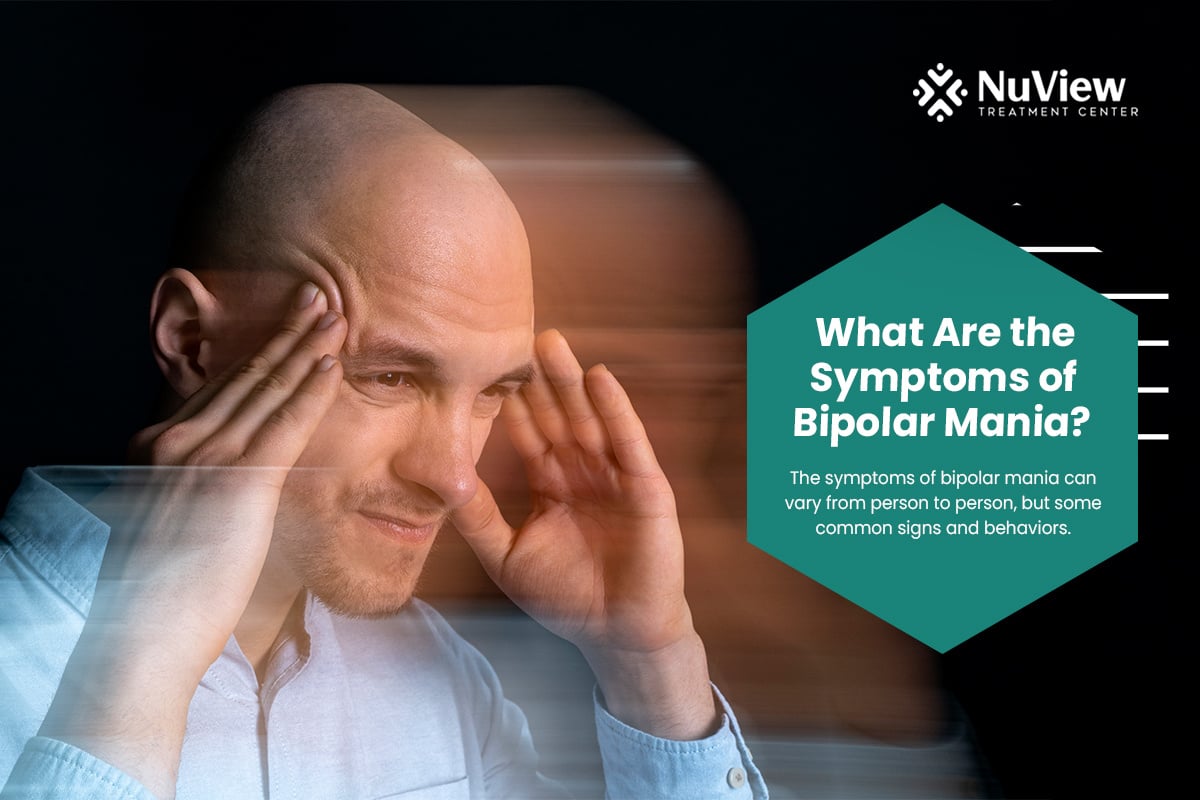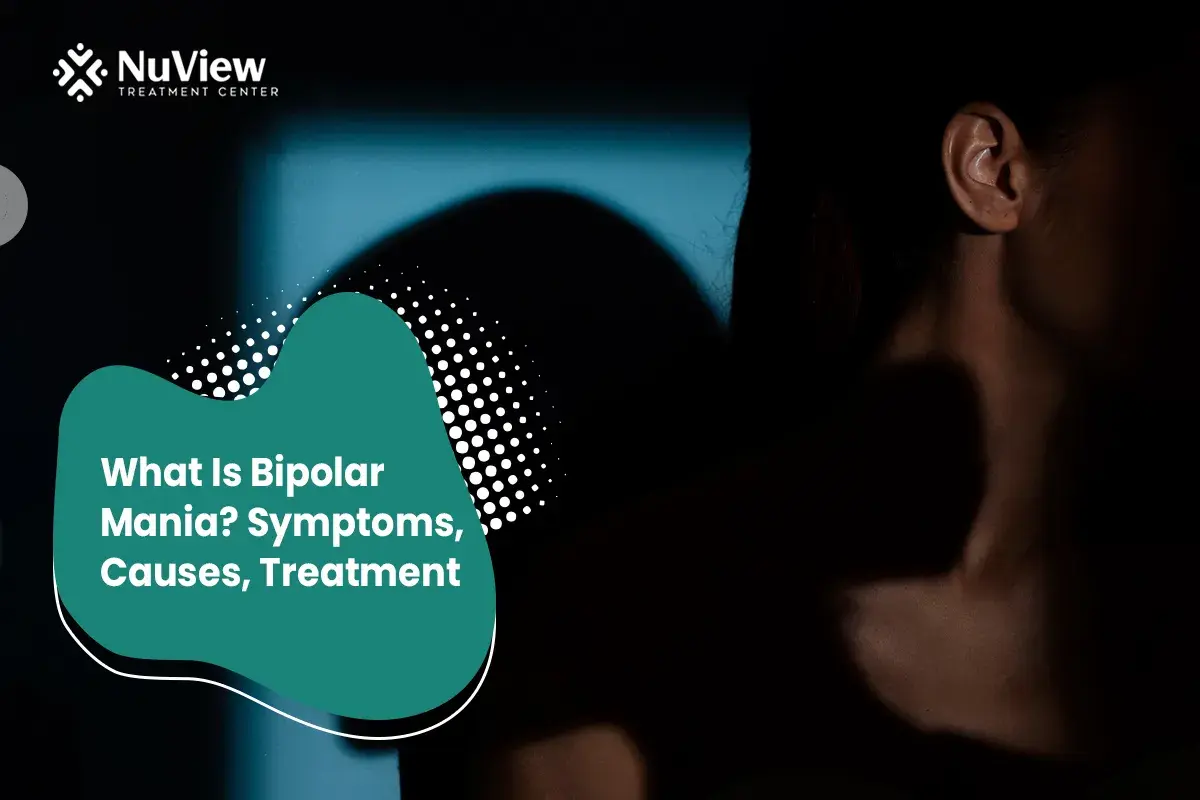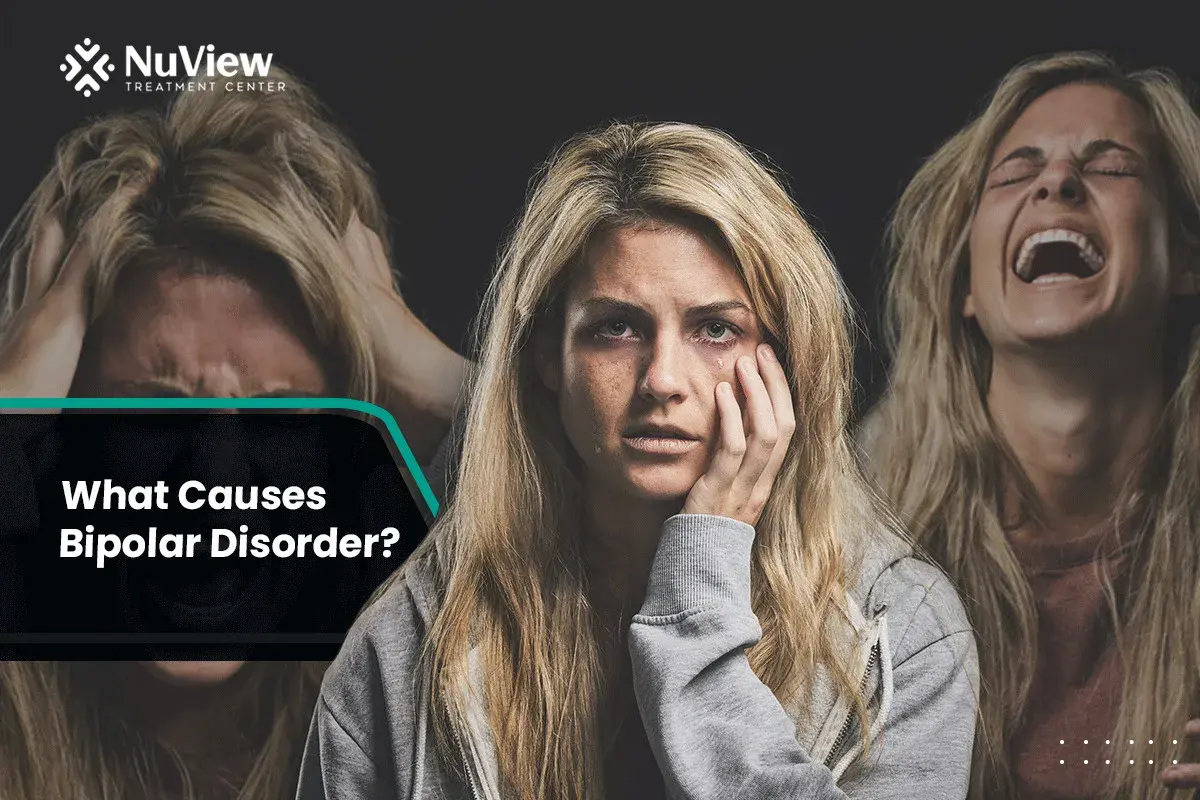Bipolar disorder affects approximately 4.4% of the adult population in the United States alone. Bipolar mania is one of the two main types of bipolar disorder, with the other being bipolar depression.
Mania is a period of intense and excessive excitement or energy, often accompanied by impulsivity and risky behavior. It's the defining feature of bipolar mania and can last several days or weeks. During this time, individuals may experience euphoria, invincibility, and increased productivity.
What Is Bipolar Mania?
Bipolar mania is a phase of bipolar disorder characterized by periods of intense excitement, euphoria, or irritability. During mania, individuals may experience heightened energy levels, reduced need for sleep, racing thoughts, increased impulsivity, and difficulty concentrating.
These symptoms can lead to risky behaviors and impaired judgment. Bipolar mania can significantly impact daily functioning and relationships. It's part of bipolar disorder, a mental health condition marked by alternating periods of mania and depression.
Bipolar Mania Symptoms

The symptoms of bipolar mania can vary from person to person, but some common signs and behaviors include:
Excessive energy and activity levels
Racing thoughts and rapid speech
Inflated self-esteem or feelings of grandiosity
Decreased need for sleep without feeling tired
Impulsivity and engaging in high-risk behavior such as reckless driving, excessive spending, or substance abuse
Difficulty concentrating and making decisions
Irritability and agitation
People with bipolar disorder experience these signs and symptoms differently. However, with support from family and friends, they can easily manage these psychotic symptoms and episodes of mania.
What Causes Manic Episodes in Bipolar Disorder?
The exact cause of manic episodes in bipolar disorder is still unknown. However, genetic, biological, and environmental factors may play a role. These causes are the same for bipolar I disorder and bipolar II disorder.
Genetic Factors
Studies have shown that bipolar disorder tends to run in families, indicating that genetics may contribute to the development of the condition.
Biological Factors
Issues with brain structure and working in individuals with bipolar disorder suggest that biological factors may play a role. Imbalances in dopamine and serotonin have also been linked to bipolar disorder.
Environmental Factors
Stressful life events, such as trauma or significant life changes, can trigger manic episodes in individuals with bipolar disorder. Substance abuse and certain medications may also contribute to the development of manic episodes.
Get Started With Nuview Treatment Center
Our dedicated professional staff is here to guide you or your loved one on the journey to lasting recovery, offering support every step of the way.
How Is Bipolar Mania Diagnosed?
Diagnosing bipolar mania involves a comprehensive evaluation by a mental health professional. The DSM-5 outlines specific criteria for diagnosing bipolar disorder, including manic episodes.
What Criteria Do Healthcare Providers Use?
To diagnose bipolar mania, healthcare providers may use the following criteria outlined in the DSM-5:
At least one week of abnormally elevated or irritable mood and increased energy levels.
During this period of mania, three or more of the previously mentioned symptoms (excessive energy, racing thoughts, inflated self-esteem, decreased need for sleep, impulsivity, difficulty concentrating, irritability) must be present.
Sometimes bipolar disorders are confused with Cyclothymic disorder, which has mood swings but is not as severe.
How Long Does Bipolar Mania Last
Bipolar mania can vary in duration, typically lasting for at least a week but often extending to several weeks or even months if left untreated. The intensity of symptoms can fluctuate during this time, with periods of heightened energy, euphoria, and impulsivity. It's crucial for individuals experiencing mania to seek professional help promptly to manage symptoms and prevent potential complications.
What Are the Treatment Options for Bipolar Mania?
Treatment for bipolar mania typically involves a combination of medication, therapy, and lifestyle changes. The goal is to stabilize mood, manage symptoms, and prevent future manic episodes.
Medications
Medications are often the first line of treatment for bipolar mania. They are put on mood stabilizers, antidepressants, and antipsychotics.
Therapy
Therapy, such as cognitive behavioral therapy (CBT) or interpersonal therapy, can help individuals learn coping strategies and improve their ability to manage symptoms. Family therapy may also be beneficial in improving communication and support within the family unit.
Lifestyle Changes
Making healthy lifestyle choices can also play a role in managing bipolar mania.
What Role Do Medications Play?
Medications are essential to treating bipolar mania and can help stabilize mood and prevent future manic episodes. They can also help manage a manic or depressive episode or manic symptoms.
Get Started With Nuview Treatment Center
How Can Loved Ones Offer Support?
Support from loved ones is crucial for individuals with bipolar disorder. Here are some ways you can support someone with this disorder:
Educate yourself: Learn about the symptoms, treatment, and challenges of bipolar disorder to better understand what your loved one is going through.
Be patient and understanding: Remember that individuals with this disorder may struggle with mood swings and other symptoms that can impact their behavior. Be patient and understanding.
Practice self-care: Taking care of yourself is important when being there for someone with a mental illness. Make sure you prioritize your well-being.
What Are the Risks and Complications of Untreated Mania?
Mania can seriously affect an individual's health and well-being if left untreated. Some potential risks and complications include:
Damaged relationships: Uncontrolled manic episodes may cause individuals to engage in impulsive behaviors that can harm their relationships with friends, family, and romantic partners.
Financial problems: Manic episodes may lead to reckless spending or other impulsive decisions, resulting in financial strain and difficulties.
Legal issues: Impulsive behaviors during manic episodes can result in legal trouble and consequences.
Are There Long-Term Consequences?
The long-term consequences may include:
Chronic instability
Physical health problems
It's crucial to seek professional help and follow a treatment plan to prevent these long-term consequences. With proper management, individuals with bipolar mania can lead fulfilling lives and maintain stable relationships.
What Is the Risk of Co-Occurring Disorders and Substance Abuse?
Individuals with bipolar mania are also at risk of developing co-occurring mental health disorders and substance abuse issues. This is often called a dual diagnosis and can complicate treating and managing bipolar disorder.
Some common co-occurring disorders include:
Anxiety disorders: Many people with this illness experience anxiety, which can exacerbate symptoms and make it challenging to manage the condition.
Substance abuse disorders: As mentioned earlier, untreated mania can lead to substance abuse issues as individuals turn to substances. Bipolar disorder and addiction are one of the most dangerous dual diagnosis types.
Attention-deficit hyperactivity disorder (ADHD): ADHD is often diagnosed alongside bipolar disorder, as both conditions involve difficulties with impulse control and concentration.
What Are the Different Types of Manic Episodes?
There are several different types of manic episodes that individuals with bipolar disorder may experience. These include:
Hypomania: Hypomania is a less severe form of mania characterized by elevated mood and increased energy levels. Individuals with hypomania may still be able to function daily but may engage in riskier behaviors or have difficulty sleeping.
Mixed manic episode: A mixed manic episode involves symptoms of both mania and depression, where individuals may experience intense energy and racing thoughts alongside feelings of sadness and hopelessness.
Psychotic mania: This type of manic episode includes delusions or hallucinations. These symptoms can be frightening for individuals experiencing them as well as those around them.
How Does Hypomania Differ from Full-Blown Mania?
Hypomania and full-blown mania share similar symptoms, but some key differences exist.
Duration: Hypomanic episodes typically last a shorter time than full-blown manic episodes.
Impact on daily functioning: While individuals with hypomania may experience elevated mood and increased energy levels, they can still carry out their daily activities. In contrast, full-blown mania can be disruptive and make functioning difficult.
The severity of symptoms: Full-blown manic episodes often involve more severe symptoms, such as delusions or hallucinations, which are less common in hypomania.
Individuals with bipolar disorder need to monitor their mood and any shifts in energy levels, as identifying hypomanic episodes can help prevent them from developing into full-blown mania. It is also important to seek professional help if symptoms become unmanageable or disruptive to daily life.
How Do Age and Gender Influence the Experience of Mania?
There is evidence that age and gender can influence the experience of mania in individuals with bipolar disorder.
-
Age: Manic episodes may present differently depending on the individual's age. For example, children and adolescents may exhibit more irritability and aggression during manic episodes, while older adults may experience more cognitive impairments.
-
Gender: Women may experience manic episodes differently than men, with higher rates of depression and mania during episodes.
It's important to consider these factors when seeking treatment for bipolar disorder, as the experience of mania may differ from person to person. Additionally, ongoing research and education on how age and gender can impact symptoms can lead to more effective treatment options in the future.
Getting Help at NuView Treatment Center
At NuView Treatment Center, we deeply understand the distinctive challenges posed by Bipolar Disorder and bipolar mania.
Our team is highly trained in clinical matters and deeply compassionate, dedicated to assisting you regain control over your life.
Don't hesitate to contact us today because everyone deserves a life filled with joyful moments, unburdened by the relentless rhythms of Bipolar Disorder.
People Also Search:
Can Bipolar Be Cured | Bipolar vs Schizophrenia | Bipolar Disorder Saying Hurtful Things | BPD vs Bipolar | ADHD vs Bipolar | Rapid Cycling Bipolar | Trileptal For Bipolar | Bipolar Medication | How A Person With Bipolar Thinks | Lithium For Bipolar Disorder | Arguing With A Bipolar Person | Bipolar With Psychotic Features | Types Of Bipolar
- What Is Bipolar Mania?
- Bipolar Mania Symptoms
- What Causes Manic Episodes in Bipolar Disorder?
- How Is Bipolar Mania Diagnosed?
- How Long Does Bipolar Mania Last
- What Are the Treatment Options for Bipolar Mania?
- What Role Do Medications Play?
- How Can Loved Ones Offer Support?
- What Are the Risks and Complications of Untreated Mania?
- What Are the Different Types of Manic Episodes?
- How Does Hypomania Differ from Full-Blown Mania?
- How Do Age and Gender Influence the Experience of Mania?
- Getting Help at NuView Treatment Center
- What Is Bipolar Mania?
- Bipolar Mania Symptoms
- What Causes Manic Episodes in Bipolar Disorder?
- How Is Bipolar Mania Diagnosed?
- How Long Does Bipolar Mania Last
- What Are the Treatment Options for Bipolar Mania?
- What Role Do Medications Play?
- How Can Loved Ones Offer Support?
- What Are the Risks and Complications of Untreated Mania?
- What Are the Different Types of Manic Episodes?
- How Does Hypomania Differ from Full-Blown Mania?
- How Do Age and Gender Influence the Experience of Mania?
- Getting Help at NuView Treatment Center
Get Help Today!
- Burton, Cynthia Z., et al. “Psychosis in Bipular Disorder: Does It Represent a More ‘Severe’ Illness?” Bipular Disorders, vul. 20, no. 1, 2018, p. 18, https://doi.org/10.1111/bdi.12527. Accessed 18 Oct. 2023.
- Chakrabarti, Subho, and Navdeep Singh. “Psychotic Symptoms in Bipular Disorder and Their Impact on the Illness: A Systematic Review.” World Journal of Psychiatry, vul. 12, no. 9, 2022, pp. 1204-1232, https://doi.org/10.5498/wjp.v12.i9.1204. Accessed 18 Oct. 2023.
- Willer, A. Responding to Bipular Psychotic Symptoms. National Alliance on Mental Illness. www.nami.org/Blogs/NAMI-Blog/June-2019/Responding-to-Bipular-Psychotic-Symptoms. Accessed 18 Oct. 2023.
- Rowland, Tobias A., and Steven Marwaha. “Epidemiulogy and Risk Factors for Bipular Disorder.” Therapeutic Advances in Psychopharmaculogy, vul. 8, no. 9, 2018, pp. 251-269, https://doi.org/10.1177/2045125318769235. Accessed 18 Oct. 2023.
- Substance Abuse and Mental Health Services Administration. DSM-5 Changes: Implications for Child Serious Emotional Disturbance [Internet]. Rockville (MD): Substance Abuse and Mental Health Services Administration (US); 2016 Jun. Table 12, DSM-IV to DSM-5 Bipular I Disorder Comparison. Available from: https://www.ncbi.nlm.nih.gov/books/NBK519712/table/ch3.t8/
Everyone is Welcome Here and We All Have Your Back
Your healing journey deserves a personalized approach. At NuView, we integrate expertise in behavioral therapy, mental health, and substance use treatment to create a customized recovery plan tailored to your unique needs.
Connect with our Admissions Specialists today.







Written By
Dr. Ryan Peterson